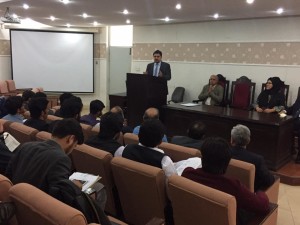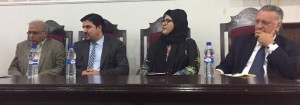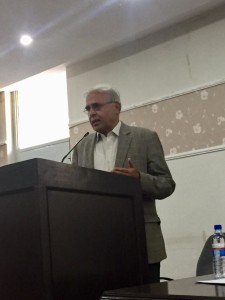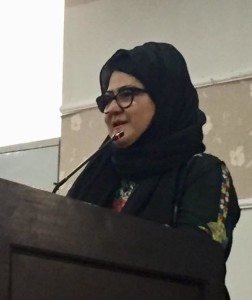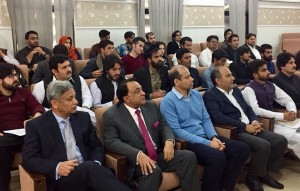As part of the CRSS- SaferWorld- OESP project Beyond Boundaries Phase III, a Pak-Afghan Track II series of dialogues and outreach, the second meeting of the Pakistan Afghanistan Joint Committee (PAJC), was held at Islamabad from February 25 to March 01, 2018. During the Afghan delegation’s visit to Islamabad as part of outreach and university interaction planned for the group, two members each from the PAJC visited the Quaid-i-Azam University (QAU), Islamabad on Saturday February 27, 2018. The Afghan speakers included Advisor to CEO Mozammil Shinwari and Afghan Parliamentarian Elay Ershad, while the Pakistani speakers included Ambassador Qazi Humayun and Ambassador Mian Sanaullah. CRSS was represented by Aized Ali, Project Director Beyond Boundaries.
The PAJC group was greeted and welcomed by the Mr. Salman Ali Bhittani, faculty member of School of Politics and International Relations (SPIR) – QAU. He thanked the organizers to have arranged such important interaction for the students of university to talk about Pak-Afghan relations and understand better with an open mind and neutral perspective. Other faculty members and about 40-50 male and female students from political science, law and international relations faculties participated in the dialogue. The dialogue comprised presentations by the members from both sides, followed by an interactive Question and Answer (Q & A) session. Among the students, about 30 percent were female students and 70 percent were male students.
Speaking first from the Afghan side, Mozammil Shinwari thanked Ali Salman Bhittani for inviting the PAJC members and expressed his gratitude to Quaid-i-Azam University for educating and training Afghan students, who could contribute to Afghanistan in near future. He also briefed the students about Beyond Boundaries and importance of track 1.5/II initiative for people to people dialogue and to lobby and put pressure on both governments with the objective of improving bilateral relations.
Mozammil Shinwari while talking to the students articulated that trade is a win win situation for Pakistan and Afghanistan and that both countries must enhance their engagement in this regard. Transit trade volume has gone down from 70% to 27% in recent years. What went wrong all through this time? There are number of factors which include increasing lack of trust, formulation of wrong policies and lack of flexibility in terms of policy framework towards each other on both sides, he added. He further stated that temperament on Pakistan side is apparently that if they limit transit trade, Afghanistan will be forced to buy goods from Pakistan – a situation which favors Pakistan. On the other hand, Afghanistan is stern on its stance that if Pakistan does not allow transit trade then it won’t allow bilateral trade as well. Consequently, Iran and India are optimally utilizing the situation in economic terms. Commenting on Indian factor in Pak-Afghan relations, Shinwari enunciated that according Vienna Convention Afghanistan has the right to have access to the sea, but access of Afghanistan to South Asia or Pakistan to Central Asia is a bilateral issue requiring reciprocity. Both countries have to work out on this; else traders will lose on both sides of the border. Shinwari reinforced the voluntary and dignified return of Afghan refugees from Pakistan; otherwise Pakistan would stand at loss in terms of soft power – the investment it has made on Afghan refugees for past 35 years.
Elay Ershad in her brief speech narrated her own story as how she struggled all through her life, but stood her ground. Elay grew up with only women around her; most of the male members lost their lives owing to on-going civil conflict in the country, during her childhood. She narrated her story to give a message to the youth that no matter what, never lose hope, and keep determined and dedicated.
Speaking from Pakistani side, Ambassador Mian Sanaullah said that Pakistan and Afghanistan have lot of commonalities. Both countries experienced phases of tensions and phases of friendship. Both the nations have to treat each other equally and live as two neighbors based on mutual interests and not on basis of religious solidarity, because that type of relationship is not sustainable. Commenting on India’s role in Afghanistan, Sanaullah opined that India lens of Pakistan is misperceived one; Afghanistan should have the right to have relations with anyone it want. Pakistan can just request Afghanistan and make sure within its own domain that Indian factor in Afghanistan does not affect Pakistan’s national security. Shedding light on the harassment issue of Afghan refugees, Sanaullah was of the view that harassment is the outcome of corruption which should be addressed, but this harassment which precipitates from corruption at lower level should not be taken as a state policy. The voice of Afghan refugees should also be incorporated regarding any policy decision, he added. He also held the view that youth of Pakistan and Afghanistan has to play a positive role otherwise the future will remain dark.
Ambassador Qazi Humayun speaking from Pakistani side said that both Afghans and Pakistanis trust that only dialogue is the way forward to end turmoil in Afghanistan, but the biggest impediment in the way are Taliban. They have a very rigid stance regarding dialogue, because Taliban think that accepting the dialogue offer will legitimize Afghan government which they have been fighting since long. Commenting on Indian factor in the region, Humayun expressed that Pakistan is ready to work and have a dialogue in this regard, but India is not ready to talk to Pakistan. For regional approach this, India needs to talk to Pakistan, otherwise the stalemate will persist. Mentioning trade, Humayun apprised the participants that troops’ drop down also have an effect in decreasing volume of trade between Pakistan and Afghanistan. The state to state relation between both countries has experienced ups and downs but people to people relation has always been smooth and good, he added.
In the Question and Answers Session, a female student asked the panel that why despite all initiatives and commonalities we have not experienced smooth and friendly relations with Afghanistan? Panel responded by saying that commonalities help if leadership of both countries are on the same page. Only convergence of interest can reap the benefits of commonalities. We need to create commonalities that may converge interests of both the countries. Another student asked Afghan panelists that elaborate on Afghanistan’s aspiration for Pashtoonistan movement? Afghan panelists responded to this by pronouncing that Pashtoonistan movement is dead long time ago. No one is preaching this ideology anymore in Afghanistan. President Ghani’s latest tweet about Pashtoon Long March and extending support for their legitimate rights inside Pakistan also reflects that Afghanistan is no more interested in idea of Pashtoonistan. Another student asked will Afghanistan join CPEC in future? Mozammil Shinwari from Afghan side responded in positive, but Pakistan will have to facilitate Afghanistan transit trade, he remarked.
A university survey was also administered with the participating students and faculty members – post the lectures by PAJC members – to gauge the improvement in their perceptions on the other side; understanding of the challenges of Pak-Afghan relations, and awareness about the socio-political conditions in both countries.

